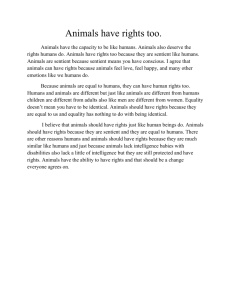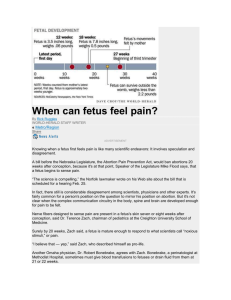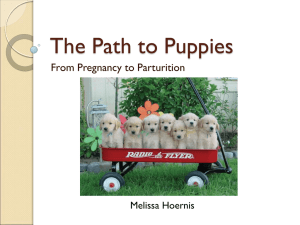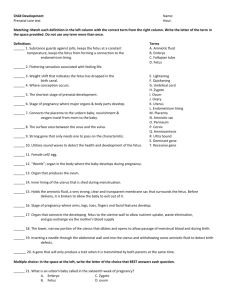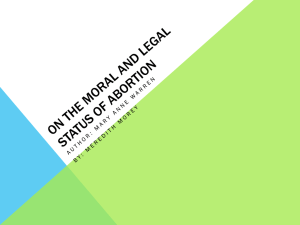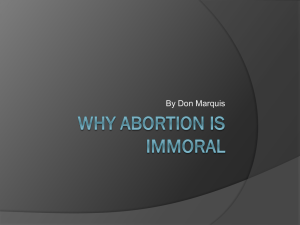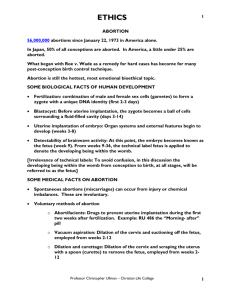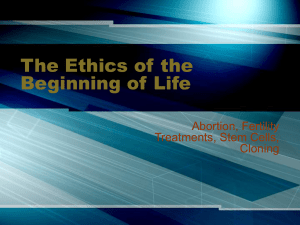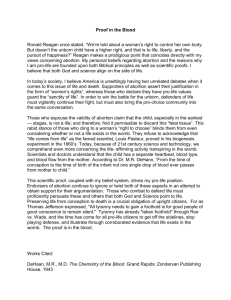Oui, Francione s`est penché sur cette question. D`abord, vers la fin
advertisement
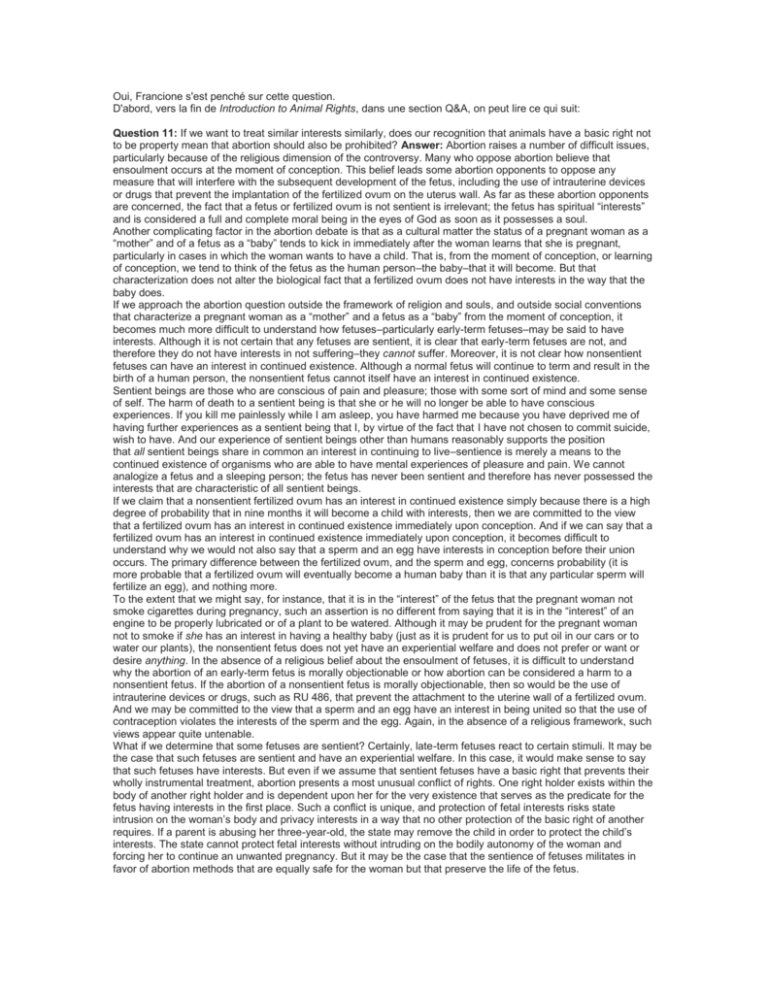
Oui, Francione s'est penché sur cette question. D'abord, vers la fin de Introduction to Animal Rights, dans une section Q&A, on peut lire ce qui suit: Question 11: If we want to treat similar interests similarly, does our recognition that animals have a basic right not to be property mean that abortion should also be prohibited? Answer: Abortion raises a number of difficult issues, particularly because of the religious dimension of the controversy. Many who oppose abortion believe that ensoulment occurs at the moment of conception. This belief leads some abortion opponents to oppose any measure that will interfere with the subsequent development of the fetus, including the use of intrauterine devices or drugs that prevent the implantation of the fertilized ovum on the uterus wall. As far as these abortion opponents are concerned, the fact that a fetus or fertilized ovum is not sentient is irrelevant; the fetus has spiritual “interests” and is considered a full and complete moral being in the eyes of God as soon as it possesses a soul. Another complicating factor in the abortion debate is that as a cultural matter the status of a pregnant woman as a “mother” and of a fetus as a “baby” tends to kick in immediately after the woman learns that she is pregnant, particularly in cases in which the woman wants to have a child. That is, from the moment of conception, or learning of conception, we tend to think of the fetus as the human person–the baby–that it will become. But that characterization does not alter the biological fact that a fertilized ovum does not have interests in the way that the baby does. If we approach the abortion question outside the framework of religion and souls, and outside social conventions that characterize a pregnant woman as a “mother” and a fetus as a “baby” from the moment of conception, it becomes much more difficult to understand how fetuses–particularly early-term fetuses–may be said to have interests. Although it is not certain that any fetuses are sentient, it is clear that early-term fetuses are not, and therefore they do not have interests in not suffering–they cannot suffer. Moreover, it is not clear how nonsentient fetuses can have an interest in continued existence. Although a normal fetus will continue to term and result in the birth of a human person, the nonsentient fetus cannot itself have an interest in continued existence. Sentient beings are those who are conscious of pain and pleasure; those with some sort of mind and some sense of self. The harm of death to a sentient being is that she or he will no longer be able to have conscious experiences. If you kill me painlessly while I am asleep, you have harmed me because you have deprived me of having further experiences as a sentient being that I, by virtue of the fact that I have not chosen to commit suicide, wish to have. And our experience of sentient beings other than humans reasonably supports the position that all sentient beings share in common an interest in continuing to live–sentience is merely a means to the continued existence of organisms who are able to have mental experiences of pleasure and pain. We cannot analogize a fetus and a sleeping person; the fetus has never been sentient and therefore has never possessed the interests that are characteristic of all sentient beings. If we claim that a nonsentient fertilized ovum has an interest in continued existence simply because there is a high degree of probability that in nine months it will become a child with interests, then we are committed to the view that a fertilized ovum has an interest in continued existence immediately upon conception. And if we can say that a fertilized ovum has an interest in continued existence immediately upon conception, it becomes difficult to understand why we would not also say that a sperm and an egg have interests in conception before their union occurs. The primary difference between the fertilized ovum, and the sperm and egg, concerns probability (it is more probable that a fertilized ovum will eventually become a human baby than it is that any particular sperm will fertilize an egg), and nothing more. To the extent that we might say, for instance, that it is in the “interest” of the fetus that the pregnant woman not smoke cigarettes during pregnancy, such an assertion is no different from saying that it is in the “interest” of an engine to be properly lubricated or of a plant to be watered. Although it may be prudent for the pregnant woman not to smoke if she has an interest in having a healthy baby (just as it is prudent for us to put oil in our cars or to water our plants), the nonsentient fetus does not yet have an experiential welfare and does not prefer or want or desire anything. In the absence of a religious belief about the ensoulment of fetuses, it is difficult to understand why the abortion of an early-term fetus is morally objectionable or how abortion can be considered a harm to a nonsentient fetus. If the abortion of a nonsentient fetus is morally objectionable, then so would be the use of intrauterine devices or drugs, such as RU 486, that prevent the attachment to the uterine wall of a fertilized ovum. And we may be committed to the view that a sperm and an egg have an interest in being united so that the use of contraception violates the interests of the sperm and the egg. Again, in the absence of a religious framework, such views appear quite untenable. What if we determine that some fetuses are sentient? Certainly, late-term fetuses react to certain stimuli. It may be the case that such fetuses are sentient and have an experiential welfare. In this case, it would make sense to say that such fetuses have interests. But even if we assume that sentient fetuses have a basic right that prevents their wholly instrumental treatment, abortion presents a most unusual conflict of rights. One right holder exists within the body of another right holder and is dependent upon her for the very existence that serves as the predicate for the fetus having interests in the first place. Such a conflict is unique, and protection of fetal interests risks state intrusion on the woman’s body and privacy interests in a way that no other protection of the basic right of another requires. If a parent is abusing her three-year-old, the state may remove the child in order to protect the child’s interests. The state cannot protect fetal interests without intruding on the bodily autonomy of the woman and forcing her to continue an unwanted pregnancy. But it may be the case that the sentience of fetuses militates in favor of abortion methods that are equally safe for the woman but that preserve the life of the fetus. Puis, il a publié un texte intitulé "Abortion and Animal Rights: Are they Compatible Issues?" paru dans Carol J. Adams et Josephine Donovan, Animals and Woman: Feminist Theoretical Explorations, Durham, NC, Duke University Press, 1995, p. 149 et ss.
